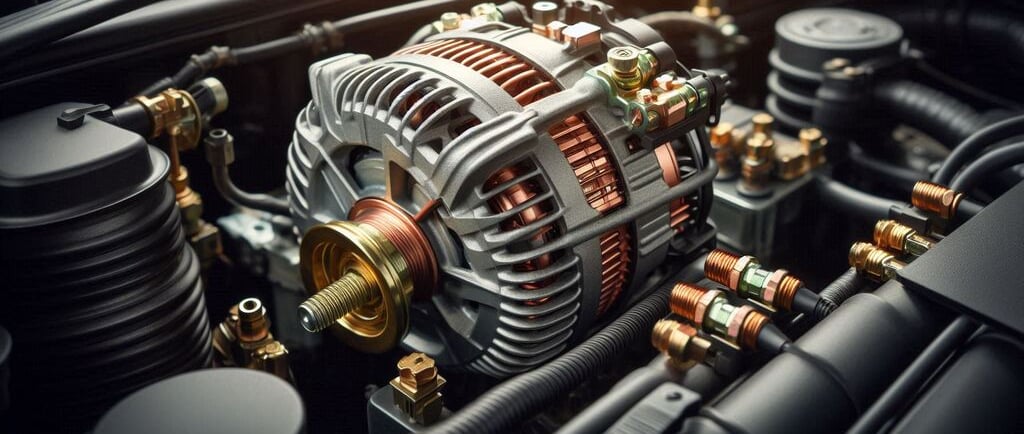Alternator: Charges the battery and powers electrical systems while the engine is running.
When you start your car, most of the electrical components—lights, air conditioning, and even your music system—are powered by the car’s alternator.
LIGHTING AND ELECTRICAL PARTS
11/12/20244 min read


Alternator: Charges the Battery and Powers Electrical Systems While the Engine Is Running
When you start your car, most of the electrical components—lights, air conditioning, and even your music system—are powered by the car’s alternator. But what exactly does this component do, and why is it so crucial to your vehicle's overall function? In this article, we’ll dive deep into the role of the alternator, how it works, and the signs that indicate it might be failing.
What Is an Alternator?
1. The Role of the Alternator
An alternator is a key component in your vehicle's electrical system. While the battery provides the initial charge to start the car, the alternator’s main job is to keep the battery charged while the engine is running and to supply electrical power to all the vehicle’s systems.
Battery charging: As the engine runs, the alternator converts mechanical energy into electrical energy, which is then used to recharge the battery.
Powering electrical systems: The alternator ensures that all your vehicle’s electrical components—like headlights, windshield wipers, and radio—are running smoothly while the engine is on.
2. How Does an Alternator Work?
The alternator is driven by a belt connected to the engine's crankshaft. As the engine turns, the belt rotates the alternator’s rotor, generating an electric current. This electricity is then sent to the battery, keeping it charged for future use.
AC to DC conversion: Alternators generate alternating current (AC), which is then converted into direct current (DC) by the rectifier, as your car’s battery and electrical systems require DC power.
Voltage regulator: The alternator also includes a voltage regulator that ensures the right amount of voltage is delivered to the electrical system, preventing overcharging or undercharging.
Signs Your Alternator Might Be Failing
1. Dimming or Flickering Lights
One of the most obvious signs that your alternator may be on the fritz is dim or flickering headlights and interior lights. This happens when the alternator isn’t generating enough electricity to properly power the electrical systems.
Why it happens: When the alternator is failing, it can’t supply sufficient power to both the battery and the electrical systems, leading to inconsistent lighting.
2. Battery Warning Light
Most modern cars are equipped with a dashboard light that indicates problems with the battery or charging system. If the alternator is malfunctioning, it will trigger the battery warning light on your dashboard.
What to do: If the battery warning light turns on while you're driving, it’s a clear signal that you should check the alternator or battery. The alternator may not be charging the battery correctly, or there could be another issue with the charging system.
3. Electrical Failures
Failing alternators can also cause electrical components like the radio, air conditioning, or power windows to malfunction. These components rely on the alternator’s power, so if it’s not functioning well, neither will they.
What to check: If multiple electrical systems in your vehicle begin to show signs of failure, the alternator could be the root cause.
How to Maintain Your Alternator
1. Regular Inspections
Keeping your alternator in top shape starts with regular inspections. While alternators are typically durable and long-lasting, regular checks can help catch any issues early.
Look for signs of wear: Check the alternator belt for any signs of fraying or cracking. If the belt is damaged, it can affect the alternator’s ability to charge the battery properly.
Listen for noises: Pay attention to any strange noises, like grinding or whining sounds, which could indicate a problem with the alternator.
2. Monitor Battery Health
Since the alternator and battery work in tandem, maintaining the health of both is essential for optimal performance.
Check the battery: Ensure that your car’s battery terminals are clean and free of corrosion. Corroded terminals can make it difficult for the alternator to charge the battery properly.
Avoid short trips: Frequent short trips can prevent the alternator from fully recharging the battery. Long drives give the alternator the time it needs to charge the battery effectively.
How to Extend the Life of Your Alternator
1. Check the Alternator Belt
The alternator belt is crucial for transferring power from the engine to the alternator. Over time, this belt can wear out and slip, causing the alternator to malfunction.
Belt inspection: Have your alternator belt checked regularly to ensure it’s tight and in good condition. A loose or worn-out belt can prevent the alternator from working properly.
2. Avoid Overloading Your Electrical System
While it’s tempting to keep all your electronics running—GPS, phone chargers, and entertainment systems—when the engine is off or running at low speeds, doing so can put extra stress on the alternator.
Limit electrical use: Turn off unnecessary electrical systems when they’re not in use, especially if you're idling or driving at low speeds. This gives the alternator a break and ensures it’s working efficiently.
Replacing a Faulty Alternator
If your alternator is beyond repair, replacing it is necessary to keep your vehicle running smoothly. While the cost of replacing an alternator can vary depending on the make and model of your car, the benefits of a new alternator are worth the investment.
Cost considerations: On average, replacing an alternator can cost between $300 and $700, depending on the vehicle and labor costs. However, this cost is significantly less than the expense and inconvenience of being stranded due to a dead battery or failed electrical system.
Professional help: If you suspect that your alternator is malfunctioning, it’s best to have a professional mechanic diagnose and replace it to ensure it’s properly installed.
Conclusion: Keep Your Alternator in Top Condition
Your alternator is a vital part of your vehicle’s electrical system, ensuring that the battery stays charged and that all electronic components function properly while the engine is running. By recognizing the signs of alternator failure early, maintaining your alternator and battery, and taking steps to prevent overloading your electrical system, you can keep your vehicle running smoothly for years to come.


